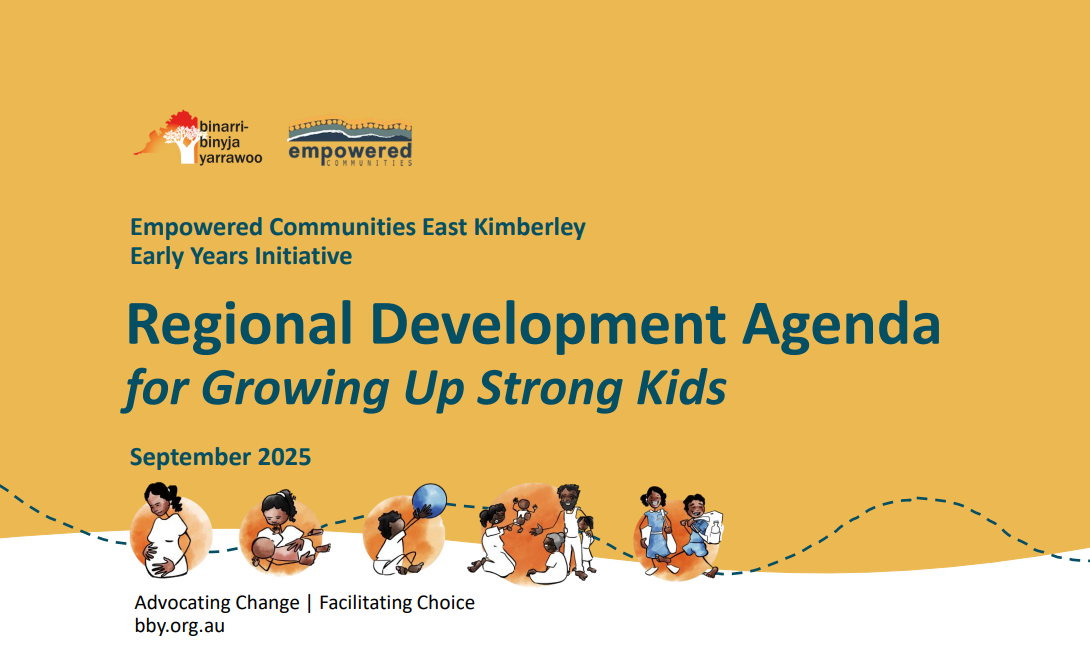Our regional agenda
Since establishment in 2016, BBY has worked to build a strong organisational base with strong governance policies, accountability to member organisations and a passion for change.
Significant work has been undertaken to start building a shared way of working within Empowered Communities and for making decisions with Government over the long term. We are committed to learning through doing, and are developing ways to effectively measure our local and regional progress.
Our regional development agenda identifies our shared priorities for the East Kimberley to improve economic, social and cultural development for Aboriginal people.
Aboriginal Development framework
Our shared goal for Aboriginal development is a community where every person has good health, a good home and strong purpose. Each person will achieve this because our families, our language and culture and our country are healthy. We will take our place in the regional economy.
For now, this is not a reality for many in our community. Too many of our people are stuck in crisis - we need things to change. By building capability, leadership and opportunity, we can work to reinforce and strengthen the 6 social norms at the heart of Empowered Communities, to help people in crisis achieve stability, then change.
We all have a part to play to help ourselves and each other create this positive change. Together we will work at every level - from individuals to organisations and Governments- to realise our vision. We will achieve this through our Regional Development Agenda, and the activities within it.
east kimberley regional development agenda
Our Regional Development Agenda identifies our shared strategic priorities for the East Kimberley region to improve economic, social and cultural development for Aboriginal people.
The agenda was first published in October 2018, iterated in September 2019 and June 2021, and recently updated in December 2023.
COMMUNITY VERSION: regional development agenda
To help the community understand our Regional Development Agenda, BBY has developed an illustrated version of the RDA, which aims to be a visual tool to inform community members about the RDA and the work of Empowered Communities East Kimberley.
Regional DEvelopment Agenda for Growing Up Strong Kids
Our Regional Development Agenda for Growing Up Strong Kids identifies our shared strategic priorities for the East Kimberley region to improve health outcomes, cultural and early childhood development for Aboriginal children in their early years.
The agenda was first published in May 2023. An annual review was completed in 2024 and an updated version was published in January 2025.
Our work in the agenda
Language and culture: Working Together
In May 2019 Empowered Communities brought together Aboriginal organisations and leaders from across the East Kimberley to talk about Language and Culture.
100+ Jobs & Employment STrategy
The ‘100+ Jobs Initiative’ was a proposal designed and led by Aboriginal leaders in the East Kimberley and handed to Federal Government in November 2016. MG Corporation was successful in winning the contract for the initiative, and launched the program in July 2018.
Kununurra Education Strategy
‘We want to invest in education by incorporating culture into the learning journey, lifting attendance rates and literacy and numeracy standards and reducing rates of developmental vulnerability. These changes will facilitate sustainable education outcomes for our children and will ultimately result in their genuine engagement with the local economy.’ Peter Brown, former BBY Chair
North West Aboriginal Housing Fund
Empowered Communities East Kimberley is in partnership with the Western Australian Government to develop projects under the North West Aboriginal Housing Fund (NWAHF), an innovative approach that sees housing as a vehicle to better health, education and employment outcomes.
The first project under the fund is the expansion of the transitional housing model in the East Kimberley, creating pathways from welfare to home ownership. It will increase housing options and support the participation of Aboriginal families in work and school so families have a greater chance of attaining economic independence.








